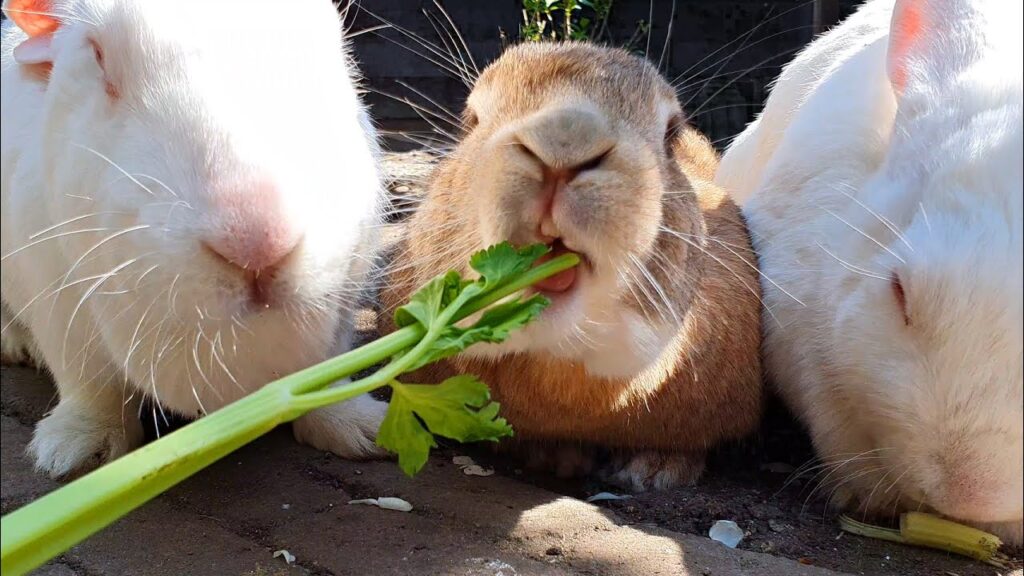Celery is a popular vegetable known for its crunchy texture and nutritional benefits. For rabbit owners, it’s important to know which vegetables are safe and beneficial for their furry friends. Can rabbits eat celery? Let’s dive into this topic to ensure your rabbit enjoys a healthy and balanced diet.
Can Rabbits Eat Celery?

Nutritional Value of Celery
Celery is a low-calorie vegetable rich in vitamins and minerals. Here are some key nutrients found in celery:
- Vitamin A: Supports eye health and immune function.
- Vitamin K: Essential for blood clotting and bone health.
- Vitamin C: Helps boost the immune system.
- Folate: Important for cell growth and metabolism.
- Potassium: Helps regulate fluid balance and muscle contractions.
Benefits of Celery for Rabbits
- Hydration: Celery has a high water content, which helps keep your rabbit hydrated.
- Fiber: The fiber in celery aids in digestion and helps prevent gastrointestinal issues.
- Low in Calories: Celery is a low-calorie snack, making it a great option for maintaining a healthy weight.
How to Safely Feed Celery to Rabbits
Feeding celery to your rabbit can be beneficial, but it’s important to do it correctly. Here’s how to safely include celery in your rabbit’s diet:
- Wash Thoroughly: Always wash celery thoroughly to remove any pesticides or chemicals.
- Cut into Small Pieces: Cut celery into small, bite-sized pieces to prevent choking hazards from the long, fibrous stalks.
- Moderation: Introduce celery gradually and feed in moderation. A small amount a few times a week is sufficient.
Observing Your Rabbit’s Reaction
As with any new food, it’s important to observe your rabbit after introducing celery to their diet. Watch for any signs of digestive issues, such as diarrhea or changes in appetite. If any adverse reactions occur, stop feeding celery and consult your veterinarian.
Overall Diet for Rabbits
A rabbit’s diet should be balanced and primarily consist of:
- Hay: The most crucial part of a rabbit’s diet, providing essential fiber.
- Fresh Vegetables: Leafy greens and other safe vegetables, such as celery, in moderation.
- Fresh Water: Always available to ensure proper hydration.
- Pellets: Commercial rabbit pellets can be included in moderation.
Other Safe Vegetables for Rabbits
In addition to celery, there are several other vegetables that are safe and beneficial for rabbits:
- Leafy Greens: Romaine lettuce, kale, and spinach are excellent choices.
- Carrots: High in vitamin A but should be fed sparingly due to their sugar content.
- Bell Peppers: Rich in vitamins and minerals, safe for rabbits.
- Broccoli: Can be fed in small amounts, but may cause gas in some rabbits.
The Rabbit Digestive System
Rabbits have a sensitive digestive system that relies heavily on fiber. A diet high in fiber helps keep their digestive system functioning properly and prevents issues like gastrointestinal stasis, a potentially life-threatening condition.
Monitoring and Adjusting Diet
Regularly monitor your rabbit’s weight and health. If you notice any changes in their eating habits, droppings, or behavior, it might be related to their diet. Consulting with a veterinarian to adjust their diet can ensure they stay healthy and happy.
Seasonal and Occasional Treats
Fresh, seasonal vegetables can be a delightful addition to your rabbit’s diet. However, always introduce new foods gradually and in small amounts to avoid upsetting their digestive system.
Bottom Line
Rabbits can safely eat celery as part of a balanced diet. Ensure the celery is washed thoroughly, cut into small pieces, and fed in moderation. Observing your rabbit for any adverse reactions and consulting with a veterinarian as needed will help keep your rabbit healthy.
- Rabbits can eat celery in moderation.
- Celery is hydrating and low in calories, making it a healthy snack.
- Always wash celery thoroughly and cut it into small pieces before feeding.
- Monitor your rabbit for any adverse reactions when introducing new foods.
- A balanced diet for rabbits includes hay, fresh vegetables, and limited fruits.
FAQ
Can Celery Cause Diarrhea in Rabbits?
If fed in large quantities, celery can cause digestive upset, including diarrhea. Always introduce celery gradually and feed in moderation.
How Much Celery Can I Give My Rabbit?
A small amount of celery, such as a few small pieces a few times a week, is sufficient. Overfeeding can lead to digestive issues.
Can Baby Rabbits Eat Celery?
It’s best to avoid giving celery to baby rabbits. Their digestive systems are more sensitive, and they should primarily eat hay, mother’s milk, and specific vegetables until they are older.
What Should I Do If My Rabbit Eats Too Much Celery?
If your rabbit eats too much celery, monitor them closely for any signs of digestive distress such as diarrhea or bloating. If any adverse symptoms occur, consult your veterinarian immediately.
What Other Vegetables Are Safe for Rabbits?
Other safe vegetables for rabbits include leafy greens, carrots (in moderation), bell peppers, and broccoli. Always introduce new vegetables gradually and observe your rabbit for any adverse reactions.
How Should I Store Celery to Ensure Freshness?
Store celery in the refrigerator to maintain its freshness. Rinse it thoroughly before feeding it to your rabbit to remove any pesticides or chemicals.

